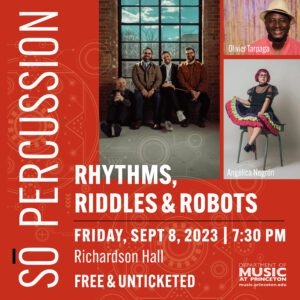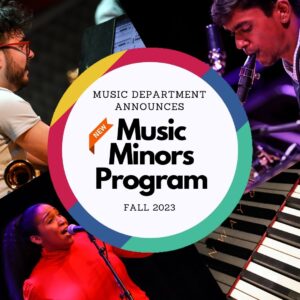Faculty Appointments: Anna Yu Wang, Arnie Tanimoto, Brennan Sweet, Yousun Chun & Julius Tolentino
The Department of Music at Princeton University is thrilled to welcome to the faculty five renowned music practitioners: music theorist and ethnographer Anna Yu Wang, viola da gamba and Baroque cello specialist Arnie Tanimoto, violinist Brennan Sweet, oboist Yousun Chung, and saxophonist Julius Tolentino. Appointed to the musicology faculty, Yu Wang joins colleagues Wendy Heller, Elizabeth Margulis, Simon Morrison, Jamie Reuland, Gavin Steingo, and Rob Wegman in serving a growing undergraduate and graduate student population; her current course, Thinking Through Musical Sound, engages students in thinking about musical sound within and across listening cultures, positioning music theory as a vehicle for worldmaking. Tanimoto, Sweet, Chung, and Tolentino join a performance faculty of nearly fifty expert practitioners that span stylistic periods and genres. Tanimoto also joins Early Music Princeton as Viol Consort Director.
Get To Know Anna Yu Wang, Assistant Professor of Music
Anna Yu Wang’s arrival on campus this fall was more sforzando than crescendo. Taking a cue from previous experience as former faculty at Bard’s Longy School of Music and associate editor of the music pedagogy journal Engaging Students (a position she still holds), Yu Wang devoted her first weeks on campus to a major project: revamping the music theory exam required of all graduate music students to promote cross-cultural literacy and understanding. “More and more, we see a demand for professional music scholars to be adept at engaging in a myriad of musical traditions in responsible and ethical ways. I’m really excited to see what the students do in this new exam, which encourages an analytical skill set that is culturally expansive” (Yu Wang). As a music theorist and ethnographer, Yu Wang is working to understand what it means — and what it takes — to listen across lines of difference. Her current book project, More than Structure: Musicality Across Two Sinitic Operas, on 黄梅戏 huangmei opera and 歌仔戲 Taiwanese opera proposes that experiencing the musicality behind tonal, metric, and formal structures is none other than to learn to adopt local (and at times, paradoxical) habits of worldmaking. In this and other work, Yu Wang reflects on the limitations of analytical paradigms that have been canonized in Anglo-American music theory. Her first course, Thinking Through Musical Sound, boldly grapples with such notions, engaging students in discussion and group listening exercises that invite reflection on the ways in which our worldviews color our perceptions of musical sound — and how musical sounds may similarly influence our thoughts, beliefs, and ideologies. “What we hold to be rational can differ widely across cultural spaces,” shared Yu Wang, “and in today’s polarized political climate, it is increasingly important to seek out contrasting perspectives. I see music studies as playing a substantial role in shaping our norms of discourse by teaching us how to listen to one another meaningfully.” In this way, music theory — and, indeed, Yu Wang’s course — may serve as a springboard to negotiate the complex discourse occurring in the public sphere. Yu Wang hopes to build on this both within the Department and beyond: “It would be especially fruitful to bring these learnings into conversation with other departments across campus, for example by creating or co-teaching a class in SPIA [the School of Public and International Affairs].”
Rapidfire Questions:
What’s your favorite thing about living in Princeton?
“So far I’m loving living in Princeton I was living in urban spaces for the last decade, but here there are so many more trees, more grass, more stars… more bugs! It really enhances one’s sense of contentment.”
What’s your “desert-island” piece of music?
“I can’t pick just one… There’s definitely Lofi Girl: through the thick and thin of doing research, it’s nice to lean back on music that isn’t too serious about itself, music that really just offers itself up as a friend. One of my favorite pieces of Western art music is the Schubert String Quintet in C Major. There are also some truly mesmerizing Sinitic opera artists whose music I’d want to keep close by — 黄新德 Huang Xinde, 韩再芬 Han Zaifen, 張秀琴 Zhang Xiuqin, and 張孟逸 Zhang Mengyi come to mind. And could I store some K-pop in my musical suitcase, too?”
What’s the best way to get to know you?
“If people want to learn more about what I aim to achieve in my classes and the impact I believe music theory holds for us today, the syllabus I submitted to Society of Music Theory’s course design competition is a good place to start. And of course, come visit me in office hours!”
Get To Know Arnie Tanimoto, Performance Faculty: Viola da gamba, Baroque Cello & Viol Consort Director, Early Music Princeton
Credit: Jiyang Chen
After a summer spent pouring over pages of quintessential Princeton architecture in a book gifted to him by a fellow period instrument collaborator, Arnie Tanimoto was eager to set foot on campus. An in-demand viola da gamba and Baroque cello player whose accolades include being named the first-ever American laureate of the International Bach-Abel Competition, Tanimoto brings a depth of technical and historical knowledge to his new role as performance faculty and Viol Consort Director of Early Music Princeton (a position formerly held by Tanimoto’s teacher during his time as the first-ever viola da gamba major at The Juilliard School, Sarah Cunningham). “Studying history is a big part of playing early music and playing period instruments,” Tanimoto shared. “We’re really the marriage between performance art and musicology. The opportunity to work with young people at the caliber of Princeton undergraduates and graduates, who are curious, intelligent, and very driven, is what really draws me to this position.” As Viol Consort Director, Tanimoto leads and plays among a consort of treble, tenor, and bass viols playing music from the 16th and 17th centuries. He also provides lessons to students on campus who play, or want to learn how to play, the gamba and/or Baroque cello: “The gamba is a very accessible stringed instrument with a vast repertoire that one can enjoy at all levels: historically, it was not just for professional musicians, but amateurs, many of whom excelled at it, too.” (The Department of Music is proud to house a collection of gambas of all sizes.) As for the Baroque cello, which differs mainly in its bow and its strings (gut), Tanimoto exalts the instrument for how it enhances the young cellist’s musicality: “Nowadays, it’s fashionable for people to dabble in period instruments: it’s fun to get a taste of playing something like the Bach cello suites on the instrument those pieces were actually intended for. But it can also be really insightful for a young cellist to explore the Baroque version of the instrument and expand their mind to this huge body of repertoire, both solo and ensemble, for Baroque cello.” When not in the studio or rehearsal room, Tanimoto looks forward to ambling around Princeton, exploring the architecture of the campus and town while pondering in his mind the architecture of his favorite works of music.
Rapidfire Questions:
What are you most excited about experiencing in the Music Department beyond your own music work?
“There’s so much, way more than I can comprehend, going on, but one thing I’m very much looking forward to are the Princeton University Concerts events. There are incredible artists coming to campus.”
What’s your “desert-island” piece of music?
“The span of my repertoire is quite large, so the best you’ll get from me is my top four composers: Bach, William Byrd, Henry Purcell, and Marin Marais (who wrote so much wonderful repertoire for the gamba). And one of my all time favorite pieces of music, although it’s not within the repertoire I typically play, is the string sextet by Schoenberg, Verklärte Nacht.”
What’s your “desert-island” book?
“Again, Marin Marais. Marais published five volumes of gamba pieces — the Pièces de viole — between 1686 and 1725. If I could take a collection of books, I’d definitely take those.”
What’s the best way to get to know you?
“Just reach out to me! I don’t have an office on campus, but correspond with me via email. Lots of fellow gamba players reach out to me, asking about what kind of strings they should play on or similar questions, and I’m always more than happy to answer their questions. I’m more than happy to talk someone’s ear off!”
Get To Know Brennan Sweet, Performance Faculty: Violin
The doctor is in — the “Violin Doctor,” that is. Over the years, Brennan Sweet has become known as the kind of teacher who doesn’t just teach technique, but who, like many of his colleagues, emphasizes the whole musician: “I’m always digging into the psychology of playing with students — how to focus in audition environments and that sort of thing. And because of my experience playing professionally and also having chaired several violin auditions, I’ve seen the process from both sides of the curtain and have a lot of insight to share with my students.” Indeed, Sweet’s students have gone on to win positions in leading orchestras including the Hudson Valley Philharmonic, Hartford Symphony, and New York Philharmonic. Coming to Princeton and taking over the studio of violin faculty colleague Eric Wyrick — the two met as stand partners in the New Jersey Symphony, where Sweet is associate concertmaster and Wyrick is concertmaster — Sweet feels a sense of being among kindred spirits. The son of a biochemist and an environmental engineer, Sweet began college as an undeclared engineering student at Washington University in St. Louis, but simultaneously worked as a professional musician across St. Louis. “What’s exciting about this role is not only how advanced the Princeton students are,” shared Sweet, “but also the kinds of students they are: they have this commitment to continuing their musical development while studying in other fields.” Sweet, who ultimately earned his undergraduate degree at Indiana University, hopes to bring to the Princeton music community the same supportive and curiosity-driven approach to music teaching that he witnessed while still a teaching assistant to American violinist Josef Gingold: “I witnessed him perform miracles with students. I aim to emulate that in my own work with students.”
Rapidfire Questions:
In your opinion, where is the best spot to grab food in town?
“I’m of the opinion that the Mamoun’s in town is the best Mamoun’s there is. And Bent Spoon is a favorite, of course.”
What’s your “desert-island” piece of music?
“Bach’s Sonatas and Partitas for Solo Violin are the thread that runs through my life and music. They have such depth and complexity: every time you come back to them, you discover something new. And it’s hard to beat the Bach Chaconne from Partita No. 2 in D minor. These pieces are a lifelong study and would certainly keep me busy on a desert island.”
What are you most excited about experiencing in the Music Department beyond your own music work?
“As I have been coming to Princeton University for many years in my role as Associate Concertmaster of the New Jersey Symphony performing in Richardson Auditorium, it’s exciting for me to now join the Music Department at Princeton University as a new faculty member, interacting with such talented and capable colleagues and hopefully having opportunities to work with student orchestras and chamber ensembles.”
Get To Know Yousun Chung, Performance Faculty: Oboe
When oboist Yousun Chung last visited campus in December 2022 to cheer on her former students as they took the stage with the Princeton University Orchestra and Glee Club for Holst’s epic orchestral suite The Planets, she had no idea that a mere eight months later she herself would be part of the Music Department community. For the past eight years, Chung has been visiting Princeton: “As a teacher at Juilliard Pre-College, I would attend a lot of concerts, search for good teachers, and basically do a lot of research to identify strong academic schools with robust music performance life for our students.” Princeton was always the top school that Chung and her colleagues would recommend. Chung reminisces fondly on her early encounters seeing Princeton University Orchestra conductor and director of the Program in Music Performance Michael Pratt: “I remember being so impressed with Maestro Pratt musically. The way in which he led the orchestra met the same expectations of how we would teach in Juilliard Pre-College.” Not long after, Chung began encouraging her students to apply, and the rest, they say, is history: “All of my former students have successfully enrolled and graduated, which I’m very proud of.” Experiencing the beauty of Princeton’s campus and attending orchestral and chamber music concerts over the years has been a joy for Chung, who now takes on her new role as Lecturer of Oboe. She aims to bring her wealth of experience and knowledge to undergraduate musicians and, more broadly, to advertise the importance of the oboe to orchestral, chamber, and solo music — each of which “is taken very seriously at Princeton,” Chung nods appreciatively. “The oboe is a very steady, very core, instrument — it’s the most responsible instrument in the orchestra. Not to mention that it was almost a hidden rule for all the composers that they had to write an oboe solo in their orchestral or ensemble music. So we also have so much wonderful repertoire!”
Rapidfire Questions:
What’s your favorite spot on campus from the times you’ve visited?
“I was so impressed with the Effron Music Building. I remember seeing lots of students on the first floor studying hard. And lots of students were practicing in the practice rooms — which, by the way, are very impressive and very different from practice rooms in old music school buildings. It felt like I was in a music school.”
What’s your “desert-island” piece of music?
“I can’t pick just one either! For chamber music, certainly Bach’s cantatas BWV 32 (Liebster Jesu, mein Verlangen) and BWV 202 (Weichet nur, betrübte Schatten), along with Barber’s Summer Music for Wind Quintet, which is a great piece to challenge young students. As for orchestral works, I love Berlioz’s Symphonie fantastique, Brahms’ Symphony No. 1, and all of Rachmaninoff. I’m so excited to hear the Princeton University Orchestra play the Rachmaninoff Symphonic Dances this fall. I also have to include Mozart’s Oboe Concerto, which I’ve played a number of times with orchestra as a soloist myself.”
What’s the best way to get to know you?
“Well, this interview, definitely! I hope our conversation will reach a lot of students. Beyond this, I have a student I’ve been teaching since he was in fourth grade, and he’s a TikTok star; he’s been working on opening my Instagram account. I think now is a great moment to introduce myself to oboe students through social media. Spencer and I are talking about creating a new website for myself as well.”
Get To Know Julius Tolentino, Performance Faculty: Saxophone
Whether you’re on the hunt for new sounds or new vinyl, Princeton’s not a bad place to be. Cutting his teeth in the New York jazz scene, saxophonist Julius Tolentino rubbed shoulders with a veritable who’s-who of jazz greats. Over the years, that list grew to include a respectable number of Tiger alumni. “I remember playing with Princeton graduate Stan Rubin (Princeton Class of ‘55), who started one of the first jazz groups at Princeton, Stan Rubin and his Tigertown Five, and whose record I actually found at the Princeton Record Exchange years later. I’ve also met a number of the current jazz faculty over the years through gigs.” The Princeton presence on the scene impressed Tolentino, who began introducing students from his own growing saxophone studio to festival offerings organized by Princeton’s former Director of Jazz Dr. Anthony Branker and encouraging promising high school seniors from his studio to apply. So, it was with great excitement that Tolentino accepted the opportunity to join the faculty on campus this fall. “It’s refreshing to work with university students in a one-on-one setting — and it will be especially so with Princeton students, who are very open to trying new things and are very focused. For the past 17 years, along with a number of other teaching posts, I’ve taught at New Jersey’s Newark Academy. To me, Newark Academy has the same approach to excellence that Princeton has; the students are all highly self-motivated and very bright. So, Princeton feels like home already.” Beyond teaching students and getting to know his new colleagues, Tolentino is looking forward to paying a visit to an old favorite, the Princeton Record Exchange, where he hopes to get his hands on some new vinyl — maybe even a few hidden gems that speak to the rich history of jazz at Princeton.
Rapidfire Questions:
What’s your “desert-island” piece of music?
“I would totally cheat and bring some kind of box set by my favorite artist, whether it be John Coltrane, Sonny Rollins, or Charlie Parker. It would be hard to choose just one. All the greats had different eras of their playing, so I’d have to think about it that way too. Although, their music is timeless; whatever era you listen to from Sonny’s music, it sounds as modern and fresh as today. And I would of course bring my saxophone.”
What’s a current project or passion you’re excited about right now?
“I started a saxophone quintet this year through my platform JTole Music. This is the first year I’ve done this, and I have some really promising saxophonists in that group that range from eighth grade to juniors in high school. They’re going to do some amazing things this year.”
What’s the best way to get to know you?
“I have students all over the world that contact me through Instagram or Facebook asking me questions about mouthpieces or recordings or wanting to take a lesson with me. I’m very passionate about jazz education and sharing jazz with students of all ages. So just approach me. Anybody can contact me at any time. And be on the lookout for a new record coming out next year, too.”
Welcome to the Department of Music, Anna, Arnie, Brennan, Yousun, and Julius!
In Other News
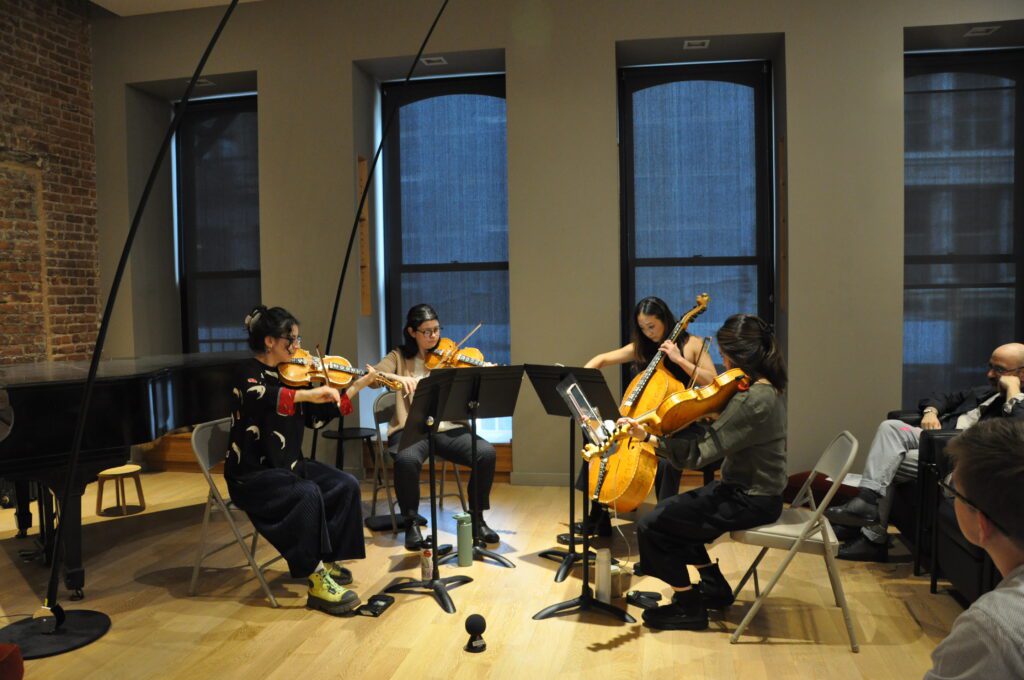
Resonant Revival: How a Norwegian Folk Fiddle Found a New Voice at Princeton
May 19, 2025
Dan Trueman, Chair of the Music Department, introduces Norwegian folk instruments to a new generation of composers and performers.
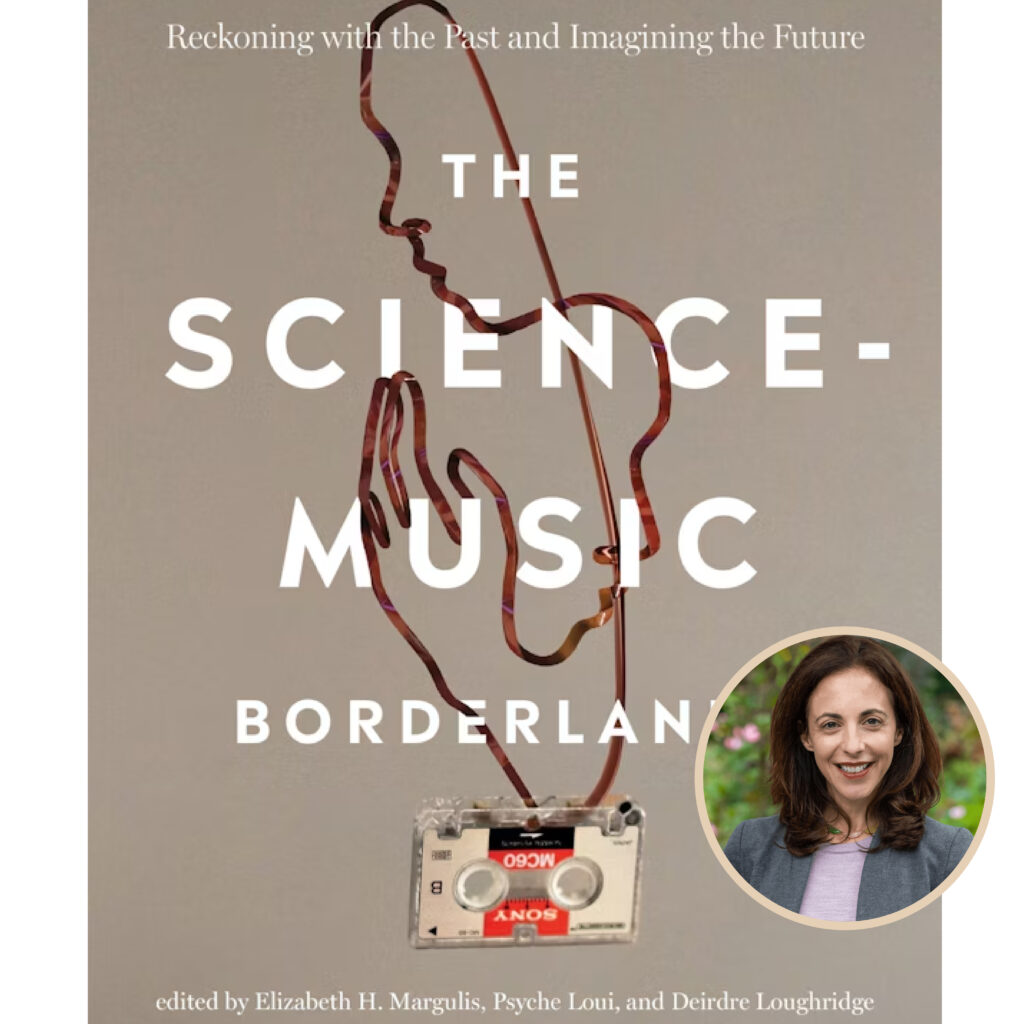
Elizabeth Margulis on the Frontiers of Music Cognition
Jan 22, 2025
The Department of Music is thrilled to congratulate musicology professor and Director of Graduate Studies Elizabeth Margulis, who has received the Ruth A. Solie Award for her editorial contributions to The Science-Music Borderlands: Reckoning with the Past and Imagining the Future.
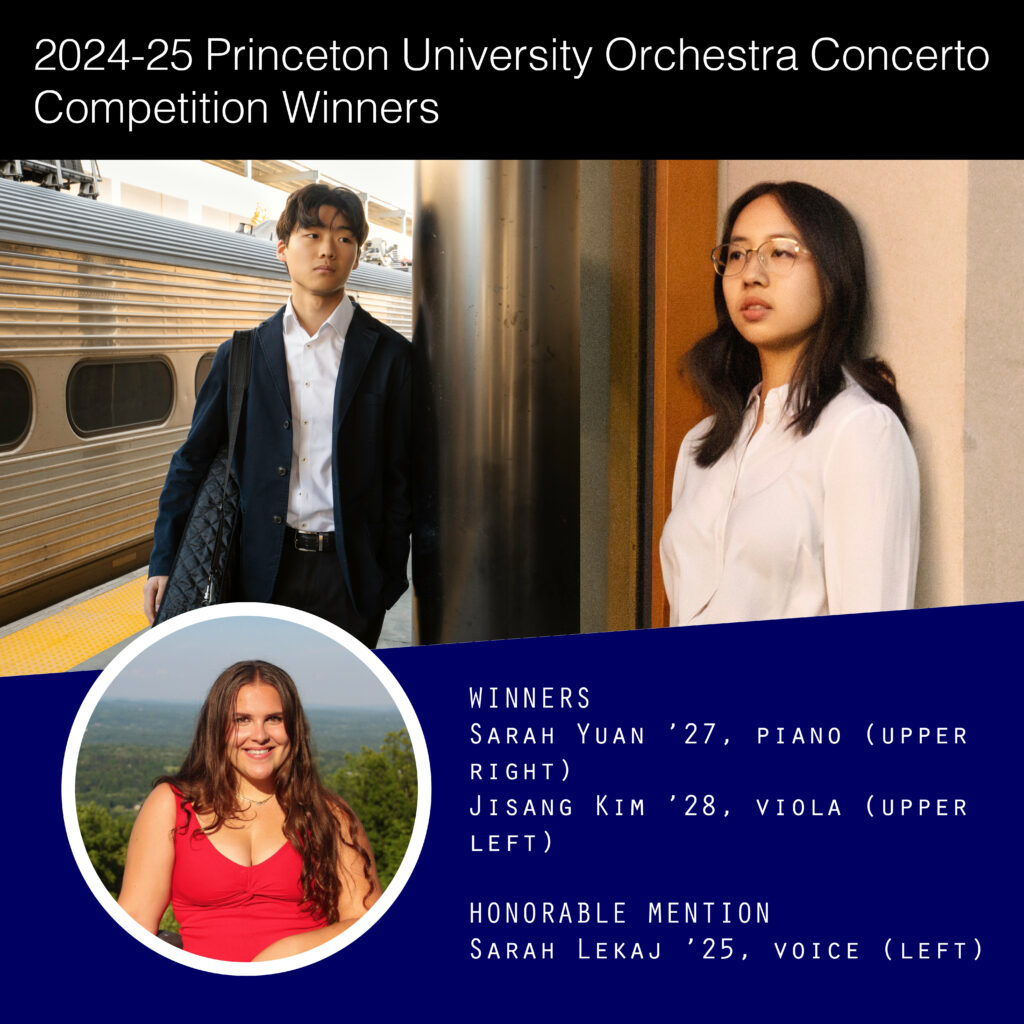
Announcing the 2024-2025 Concerto Competition Winners
Jan 16, 2025
The Music Department is excited to announce the winners of the 2024-25 Princeton University Orchestra’s annual Concerto Competition: Sarah Yuan and Jisang Kymm. Both will have the honor of performing …


